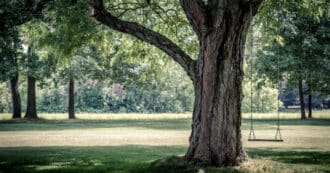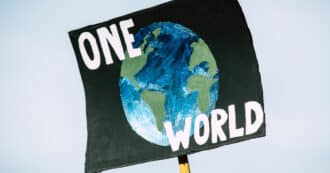Deuteronomy 30:15-20
The Rev. Dr. Leah D. Schade; leahschade@gmail.com
Here are ideas for reading and preaching Deut. 30:15-20. This text is assigned for Sept. 7th, 2025, the Thirteenth Sunday after Pentecost in the Revised Common Lectionary. This is part of the EcoPreacher 1-2-3 series to equip preachers and congregations for engaging the Bible through an ecological lens.
What does it mean to “choose life” in an age of eco-cide? In Deut. 30:15-20, Moses lays out a stark decision while calling on heaven and earth bear to witness to our choices.
Deut. 30:15, 19
“See, I set before you this day life and honor, death and evil . . . choose life.”
Eco-Exegesis
Eco-exegesis is a method of interpreting the biblical text through a green lens using the principles of ecological theology. For this passage, we turn to Eco Bible, a Jewish ecological commentary on the Hebrew texts.
Jewish sages once told Alexander the Great that a wise man is “the person who sees the consequences of an action.”i (192). In Deut. 30:15-20, Moses is trying to help his people understand the consequences of their actions as they prepare to enter into the promised land of Canaan. In no uncertain terms, he shows them two paths – one of life and health versus one of death and destruction. According to Eco Bible, “Rabbi Abraham ben Meir ibn Ezra [11th-12th century, Spain] explains that ‘life’ here refers to ‘a long life’ and ‘good’ refers to ‘prosperity, good health, and honor,’ while death and evil are the opposite” (191).
Looking at the deteriorating conditions of this planet, it is difficult to avoid the conclusion that the majority of humanity has chosen the wrong path. Fossil fuel executives chose short term profit over long-term preservation of land, water, and the climate. They did this even after learning the consequences of extracting coal, oil, and gas would bring environmental and climate disaster. Industries and manufacturers choose to protect their bottom line instead of the people who are poisoned and communities that are polluted. Capitalist economies propagate a spirituality of consumption that promises “the good life” while creating an endless cycle of debt and poverty for its workers.
In contrast, Moses’s words compel us to choose a different path, one that adheres to God’s laws of reciprocity in nature and seeks to preserve the web of life for all, not just the privileged few. He even invokes nature itself – heaven and earth – to bear witness to the choices that humanity will make. Moses implores his people to “choose life” so that not just the current generation, but future generations can thrive.
But this is one of the most difficult, and oft-failed, choices humanity must make. As Eco Bible observes, “Decisions we make every day – such as the food we eat, the waste we produce, or the fossil fuels we burn – may give us physical and even emotional comfort and pleasure in the short term. This makes it more difficult to let go of immediate gratification, even when it threatens our own future and the future of our children and grandchildren.” (191).
This is why “choosing Earth for life” is key when making decisions about human activities. Prioritizing the health, wellbeing, and stability of Earth’s ecosystems means that all species will be able to thrive. In the age of eco-cide, we need to focus on Earth’s ability to sustain life through its atmosphere, oceans, rivers and streams, lakes, farmlands, meadows, mountains, forests, wetlands, tundra, and artic areas. Choosing Earth for life involves de-centering a human-only ethic of care in favor of an Earth-ethic that reconstructs our worldview to include all that God has created on this planet.
Here’s where churches and other houses of worship can help turn people back to the life-giving path. They can create communities of intentionality, holding each other accountable, educating each other, and supporting actions that choose life. Faith communities can see the task of equipping people to grapple with complex environmental challenges as part of their “choose life” mission. And when those faith communities network and link with each other, they can stand strong against the temptations of the death-path. They can encourage individuals and congregations to choose life for Earth, and choose Earth for life.
1. Eco-Idea
The Eco-Idea is one succinct statement that tells us who God is and/or what God does in relation to Creation and how we should respond as people of faith.
When we choose life for Earth, we choose Earth for life, thus responding to Moses’s command to honor and obey the God of Creation.
2. Eco-Questions
Eco-Questions are what we can ask to help a congregation draw out the implications of the Eco-Exegesis and Eco-Idea.
- What are the Creation-care practices we do in this congregation that demonstrate we are on the “choose life” path? What more could we do to choose life for Earth and choose Earth for life?
- Who is the wisest, most ecologically-minded person you know? What things do they do that model the “choose life” path? In what ways do they inspire you to follow in their footsteps?
3. Eco-Actions
Eco-Actions are ways that a congregation might respond to the Eco-Idea and Eco-Questions. One of these possibilities may have salience for your ministry context.
- Create or join a “green committee” or “eco ministry” in the house of worship you attend. Learn what they are doing to help the congregation choose life through Creation-centered worship, education, building and grounds, and financial decisions that honor God’s commands. (Note, I will be co-teaching a month-long online course on “Developing Green Congregations” through Lexington Theological Seminary, Feb. 27-March 25, 2023, with the Rev. Carol Devine, director of ecoAmerica’s Blessed Tomorrow. Auditors are welcome! Click here for more information: https://lextheo.edu/prospective-students/request-information/.)
- Challenge your congregation to get its energy from sustainable sources, such as solar or wind co-ops. Also, take actions to weatherize and insulate the church building so that it uses less energy.
- Read the United Nations World Charter for Nature with members of your congregation. Petition your local politician to read, publicize, and ideally implement its aims. https://digitallibrary.un.org/record/3929?ln=en.
* Featured image source





